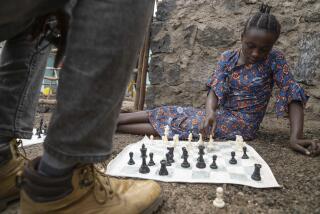CHESS : FAIR PLAY
- Share via
Chess is the purest form of competition; the better thinker wins.
Unfortunately, recent changes have distorted American tournaments. Players no longer compete under identical conditions. The trend began in the 1960s with the introduction of half-point byes. Directors felt that they could boost attendance in their tournaments by awarding a half-point to prospective entrants who had to skip a round. Soon, players could request one or two byes in rounds of their choosing. Some players began to demand byes for selfish purposes, to improve their chance for easy pairings, but few directors objected.
The next step was alternate schedules. Can’t play three days? Take the two-day option, and play several quick games to make up for the slow ones that you missed. Again, the rationale was increased attendance. Naturally, the abuses mounted. By the late 1980s, the U.S. Open, the U.S. Chess Federation’s unique two-week, 12-round tournament, was promoting its Busy Persons schedule: skip the first week, start with a predetermined score in Round Seven, play just six games and maybe you could become U.S. Open champion.
A few years ago, Bill Goichberg, the nation’s leading tournament organizer and a genuine innovator, came up with the worst idea yet. He let players pay a second entry fee to restart a tournament. Someone who lost in the first round could pay to reenter, then go on to win the tournament with a “perfect” score. Goichberg’s brainstorm was copied by other directors, but this time, they could not use the excuse of attracting entrants who otherwise could not fit chess into their schedules. The only point of reentries is to accept money from gamblers who do not fancy their chances of winning a prize legitimately.
What’s next? Paying to take back a bad move?
The director’s primary duty should be to ensure the integrity of his tournament. Too often, directors choose money over fair play.
LOCAL NEWS
The Chess Palace April Grand Prix attracted 27 players, including eight masters, last weekend in Long Beach. The March winner, GM Rosendo Balinas, repeated his success, scoring 3 1/2- 1/2 to take first prize. Second at 3-1 was IM Marc Leski, who nicked Balinas for his only draw. William Longren, Gregg Small and Charles Van Buskirk tied for third at 2 1/2-1 1/2. Robert Hatfield and Michael Purcell split the under-2200 prize.
Haig Avakian topped the Amateur (under-2000) section with 3 1/2- 1/2, a half-point ahead of Ken Poole. Class prizes went to David Barr, Arif Hasan and Howard Hugger.
Charles Rostedt, owner of Chess Palace, announced that the April Grand Prix was the last in his series of weekend Grand Prix tournaments. For unknown reasons, few masters and experts entered the monthly events designed to appeal to strong players. But Chess Palace will continue its usual hectic schedule with Thursday and Sunday Action chess tournaments, Friday night blitz, Saturday quads, and the one-game-per-week Wednesday Knights (the next one starts May 1). For full information, call (310) 634-8477.
The Knights of Valencia will run a five-round tournament on Thursday nights, beginning April 25, at Chess for Kids, 25345 Avenue Stanford in Valencia. Register at the site at 7:30 p.m., or call Jay Stallings at (805) 294-8650 for details.
The Wilshire Action quad, a three-round tournament of 45-minute games, takes place April 28 in the Community Room (third floor, near the food court) of the Westside Pavilion in Los Angeles. For more information, call Raymond de Turenne at (213) 253-7102.
The Antelope Valley Chess Club plans continuous tournaments of one-hour games on Tuesday evenings. The next one starts April 30 at VFW Post 7283 at 45541 Sierra Highway in Lancaster. Call Dec Cuerdon at (805) 726-1323 for information.
More to Read
Go beyond the scoreboard
Get the latest on L.A.'s teams in the daily Sports Report newsletter.
You may occasionally receive promotional content from the Los Angeles Times.










